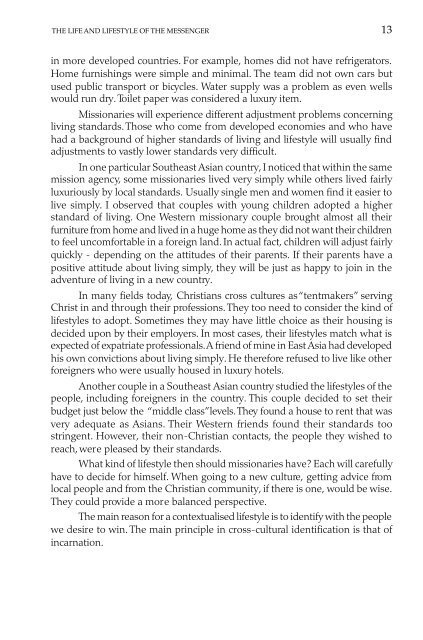WHEN YOU CROSS CULTURES - World Evangelical Alliance
WHEN YOU CROSS CULTURES - World Evangelical Alliance
WHEN YOU CROSS CULTURES - World Evangelical Alliance
You also want an ePaper? Increase the reach of your titles
YUMPU automatically turns print PDFs into web optimized ePapers that Google loves.
THE LIFE AND LIFESTYLE OF THE MESSENGER<br />
in more developed countries. For example, homes did not have refrigerators.<br />
Home furnishings were simple and minimal. The team did not own cars but<br />
used public transport or bicycles. Water supply was a problem as even wells<br />
would run dry. Toilet paper was considered a luxury item.<br />
Missionaries will experience different adjustment problems concerning<br />
living standards. Those who come from developed economies and who have<br />
had a background of higher standards of living and lifestyle will usually find<br />
adjustments to vastly lower standards very difficult.<br />
In one particular Southeast Asian country, I noticed that within the same<br />
mission agency, some missionaries lived very simply while others lived fairly<br />
luxuriously by local standards. Usually single men and women find it easier to<br />
live simply. I observed that couples with young children adopted a higher<br />
standard of living. One Western missionary couple brought almost all their<br />
furniture from home and lived in a huge home as they did not want their children<br />
to feel uncomfortable in a foreign land. In actual fact, children will adjust fairly<br />
quickly - depending on the attitudes of their parents. If their parents have a<br />
positive attitude about living simply, they will be just as happy to join in the<br />
adventure of living in a new country.<br />
In many fields today, Christians cross cultures as “tentmakers” serving<br />
Christ in and through their professions. They too need to consider the kind of<br />
lifestyles to adopt. Sometimes they may have little choice as their housing is<br />
decided upon by their employers. In most cases, their lifestyles match what is<br />
expected of expatriate professionals. A friend of mine in East Asia had developed<br />
his own convictions about living simply. He therefore refused to live like other<br />
foreigners who were usually housed in luxury hotels.<br />
Another couple in a Southeast Asian country studied the lifestyles of the<br />
people, including foreigners in the country. This couple decided to set their<br />
budget just below the “middle class” levels. They found a house to rent that was<br />
very adequate as Asians. Their Western friends found their standards too<br />
stringent. However, their non-Christian contacts, the people they wished to<br />
reach, were pleased by their standards.<br />
What kind of lifestyle then should missionaries have? Each will carefully<br />
have to decide for himself. When going to a new culture, getting advice from<br />
local people and from the Christian community, if there is one, would be wise.<br />
They could provide a more balanced perspective.<br />
The main reason for a contextualised lifestyle is to identify with the people<br />
we desire to win. The main principle in cross-cultural identification is that of<br />
incarnation.<br />
13

















